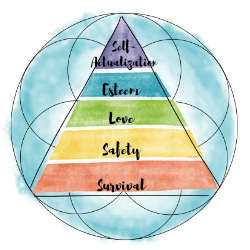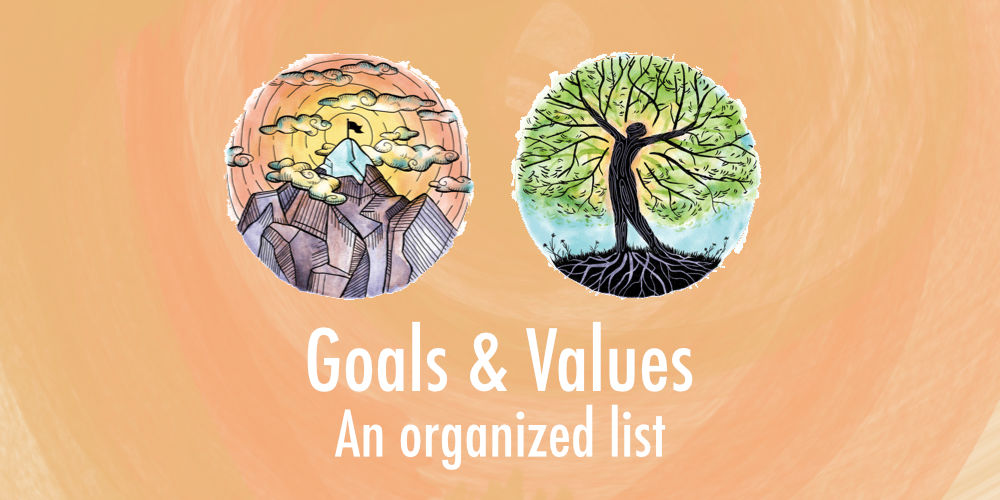Wellness is often misunderstood as simply being physically fit or eating healthy. However, true wellness goes beyond these basics.
Let's look at 3 different frameworks or paradigms that can help us visualize how to achieve balance and alignment in each area of life. You can choose a macro approach or a more detailed micro approach.
Paradigms of Holistic Wellness
The first paradigm, mind, body, and spirit, is a macro way to organize our values and goals because it’s only three sections and not as detailed. We use this concept to understand that we need to put effort into and create goals that support our physical, mental, emotional, and spiritual selves.
The second framework is Maslow’s Hierarchy of Needs. This breaks it down even further into five different areas of life and gives a starting point. If you don’t know where to start, begin with the foundational needs and work your way up.
The third framework is the most comprehensive: the 8 dimensions of wellness. As it states, it breaks life down into 8 dimensions, this a more micro detailed way to organize goals, values, and habits.
What you choose depends on how much detail you like. A macro framework is good for people who don’t need or like a lot of details. A micro approach is for someone who benefits from more specific detail.
Personally, I find value in using all the frameworks to guide my wellness journey. When life feels busy, I prefer to take a more macro approach. Instead of getting bogged down in the details, I simplify my focus by asking myself a few key questions: ‘Did I engage my mind in something stimulating or meaningful today? Did I take care of my body with movement, nourishment, or rest? Did I nurture my spirit through reflection, connection, or mindfulness?’ These simple, yet powerful, questions help me stay aligned with my values and goals.


Body, Mind & Spirit
Physical Health
Value: Exercise
- Goal: Engage in at least 30 minutes of physical activity, such as jogging, flexibility or strength training, five days a week.
- Goal: Participate in a local fitness challenge or race, such as a 5K run or a cycling event.
Value: Nutrition
- Goal: Adopt a whole-food, plant-based diet, focusing on consuming more fruits, vegetables, and whole grains.
- Goal: Meal prep for the week every Sunday to ensure balanced, nutritious meals.
Value: Sleep
- Goal: Establish a consistent bedtime routine to get 7-8 hours of sleep each night.
- Goal: Reduce screen time before bed by reading a book or practicing meditation instead.
Value: Avoiding Harmful Habits
- Goal: Commit to quitting smoking or reducing alcohol consumption to improve overall health.
- Goal: Replace excessive caffeine intake with healthier alternatives, such as herbal teas, maca powder or water.
Mental Health
Value: Intellectual Stimulation
- Goal: Dedicate 30 minutes each day to learning something new, such as through reading or online courses.
- Goal: Engage in puzzles, brain games, or learning a new language to challenge your cognitive abilities.
Value: Mental Clarity
- Goal: Practice mindfulness meditation daily to enhance focus and reduce mental clutter.
- Goal: Set aside time each week for journaling to process thoughts and emotions.
Value: Emotional Stability
- Goal: Develop a daily gratitude practice to foster a positive outlook on life.
- Goal: Attend regular therapy sessions or support groups to maintain emotional well-being.
Emotional Health
Value: Self-Awareness
- Goal: Reflect on personal triggers and responses by keeping an emotion journal.
- Goal: Participate in workshops or courses on emotional intelligence to enhance self-understanding.
Value: Emotional Regulation
- Goal: Practice deep breathing exercises or progressive muscle relaxation during stressful situations.
- Goal: Develop a toolkit of coping strategies, such as positive affirmations or visualization techniques.
Value: Healthy Relationships
- Goal: Set boundaries in relationships to ensure mutual respect and understanding.
- Goal: Regularly schedule quality time with loved ones to strengthen emotional connections.
Spiritual Health
Value: Sense of Purpose
- Goal: Define your life mission or personal mantra to guide your daily actions.
- Goal: Volunteer for causes that align with your core beliefs and values.
Value: Inner Peace
- Goal: Dedicate time each day for meditation, prayer, or reflective solitude to cultivate inner tranquility.
- Goal: Create a calming space in your home, such as a meditation corner or altar, to support your spiritual practice.
Value: Connection to Something Greater
- Goal: Engage in regular community service or acts of kindness to foster a sense of belonging and purpose.
- Goal: Explore spiritual practices, such as yoga, tai chi, or attending spiritual retreats, to deepen your connection with the universe.
Each aspect is equally important and influences the others. For example, chronic stress (emotional health) can lead to physical ailments, while a lack of purpose (spiritual health) can cause emotional distress.


Maslow’s Hierarchy of Needs
Abraham Maslow’s Hierarchy of Needs is a psychological theory that outlines the stages of human growth and development. It’s typically depicted as a pyramid with five levels:
Physiological Needs
Value: Basic Survival
- Goal: Ensure access to fresh, nutritious food by planning weekly grocery shopping trips and meal prepping.
- Goal: Maintain adequate hydration by drinking at least 8 glasses of water daily.
Value: Shelter
- Goal: Secure safe and stable housing by budgeting and saving for rent or mortgage payments.
- Goal: Create a comfortable living environment by regularly cleaning and organizing your home.
Safety Needs
Value: Security
- Goal: Build a financial safety net by saving a portion of your income in an emergency fund.
- Goal: Implement safety measures in your home, such as installing smoke detectors, security systems, and locks.
Value: Stability
- Goal: Establish a routine that includes consistent work, exercise, and relaxation to create a sense of stability in your life.
- Goal: Engage in regular health check-ups to maintain physical well-being and prevent potential health issues.
Love and Belonging
Value: Relationships
- Goal: Nurture close relationships by setting aside quality time for friends and family each week.
- Goal: Practice active listening and empathy in conversations to strengthen emotional connections with others.
Value: Community
- Goal: Join local clubs or groups that align with your interests to build a sense of community and belonging.
- Goal: Participate in community service projects to contribute to and connect with your local area.
Value: Love
- Goal: Express love and appreciation to your loved ones through regular acts of kindness and communication.
- Goal: Work on developing self-love through affirmations, self-care practices, and setting healthy boundaries.
Esteem Needs
Value: Self-Esteem
- Goal: Set and achieve small, realistic goals to build confidence and a sense of accomplishment.
- Goal: Engage in activities that boost self-esteem, such as learning a new skill or practicing a hobby.
Value: Recognition
- Goal: Seek constructive feedback from peers or supervisors to improve and gain recognition for your efforts.
- Goal: Celebrate personal achievements, big or small, to acknowledge your progress and hard work.
Value: Respect
- Goal: Treat others with respect by being mindful of their needs and boundaries in all interactions.
- Goal: Cultivate self-respect by honoring your values, beliefs, and personal standards in daily life.
Self-Actualization
Value: Personal Potential
- Goal: Identify your strengths and passions and pursue activities that allow you to utilize them fully.
- Goal: Set long-term personal and professional goals that challenge you to grow and reach your full potential.
Value: Self-Fulfillment
- Goal: Engage in activities that bring you joy and satisfaction, such as creative pursuits, volunteering, or travel.
- Goal: Reflect regularly on your personal journey and adjust your goals to ensure continuous growth and fulfillment.
Value: Personal Growth
- Goal: Commit to lifelong learning by regularly seeking out new experiences, education, and personal challenges.
- Goal: Practice self-reflection and mindfulness to stay aligned with your values and personal development goals.
Maslow later added three more levels: cognitive needs (knowledge and understanding), aesthetic needs (appreciation of beauty), and transcendence (helping others achieve self-actualization). This hierarchy illustrates that achieving wellness involves not only meeting basic physical needs but also fulfilling emotional and psychological needs.


The Eight Dimensions of Wellness
The Eight Dimensions of Wellness model, developed by the Substance Abuse and Mental Health Services Administration (SAMHSA), expands on the concept of wellness to include multiple interconnected areas.
Emotional Wellness
Value: Coping with Life
- Goal: Practice mindfulness meditation for 10 minutes daily to manage stress and enhance emotional resilience.
- Goal: Develop a routine of journaling to process emotions and reflect on personal growth.
Value: Creating Satisfying Relationships
- Goal: Schedule regular check-ins with close friends or family members to nurture relationships.
- Goal: Attend relationship counseling or workshops to improve communication and emotional connection.
Environmental Wellness
Value: Pleasant Living Environment
- Goal: Declutter your living space by removing unnecessary items and organizing your home.
- Goal: Incorporate plants and natural elements into your living space to create a more calming and stimulating environment.
Value: Supporting Well-being
- Goal: Reduce environmental impact by adopting sustainable practices, such as recycling and reducing energy consumption.
- Goal: Spend at least 30 minutes a day outdoors to connect with nature and improve your overall well-being.
Financial Wellness
Value: Financial Security
- Goal: Create and stick to a monthly budget to ensure spending aligns with financial goals.
- Goal: Build an emergency savings fund with at least three to six months’ worth of living expenses.
Value: Future Financial Planning
- Goal: Invest in retirement accounts or other long-term savings plans to secure financial stability in the future.
- Goal: Take a personal finance course to improve financial literacy and make informed decisions about investments.
Intellectual Wellness
Value: Creative Expression
- Goal: Engage in a creative hobby, such as painting, writing, or music, for at least one hour each week.
- Goal: Participate in local art shows or exhibitions to showcase and challenge your creative abilities.
Value: Expanding Knowledge
- Goal: Read one new book each month on a topic that interests you to broaden your understanding.
- Goal: Attend workshops, seminars, or online courses to learn new skills or enhance existing ones.
Occupational Wellness
Value: Personal Satisfaction at Work
- Goal: Set clear career goals and pursue opportunities for professional development and advancement.
- Goal: Regularly seek feedback from peers and supervisors to improve job performance and satisfaction.
Value: Enrichment from Work
- Goal: Engage in projects that align with your passions and strengths to find greater fulfillment in your work.
- Goal: Volunteer for tasks or initiatives within your workplace that contribute to a positive and supportive work environment.
Physical Wellness
Value: Physical Activity
- Goal: Exercise for at least 30 minutes a day, five days a week, incorporating a mix of cardio, strength training, and flexibility exercises.
- Goal: Join a local sports team or fitness group to make physical activity more social and enjoyable.
Value: Healthy Eating
- Goal: Plan and prepare balanced meals each week that include a variety of fruits, vegetables, and whole grains.
- Goal: Reduce processed foods and added sugars from your diet to improve overall health.
Value: Restful Sleep
- Goal: Establish a bedtime routine that allows for 7-8 hours of sleep each night.
- Goal: Create a sleep-friendly environment by minimizing light and noise in your bedroom.
Social Wellness
Value: Connection and Belonging
- Goal: Join local clubs, groups, or organizations that align with your interests to expand your social circle.
- Goal: Schedule regular social activities, such as dinners or outings, with friends and family to strengthen bonds.
Value: Support System
- Goal: Identify and maintain relationships with individuals who provide emotional and practical support.
- Goal: Participate in community service activities to give back and connect with others in meaningful ways.
Spiritual Wellness
Value: Sense of Purpose
- Goal: Reflect on and define your core values and beliefs to guide your life decisions and actions.
- Goal: Engage in activities that align with your spiritual beliefs, such as meditation, prayer, or attending religious services.
Value: Meaning in Life
- Goal: Volunteer for causes that resonate with your spiritual values to contribute to something larger than yourself.
- Goal: Set aside time each week for self-reflection and practices that deepen your spiritual connection.
Each of these dimensions contributes to our overall sense of wellness, and neglecting any one area can impact the others. For instance, poor financial wellness can lead to stress and anxiety, affecting emotional wellness.


Habits
Habits are the daily actions that ultimately lead to the achievement of your goals.
- Write in your Habit Journal: By reflecting on your existing routines and habits you can make adjustments to add new actions that support your goals and values.
- Start small: Begin with manageable changes that can gradually become more significant.
- Be consistent: Consistency is key to habit formation. Try to incorporate your goal actions into your daily routine until they become second nature.
- Reflect and adjust: Regularly evaluate your habits to ensure they continue to align with your goals and values. Don’t be afraid to make adjustments as needed.


Take Action
-
Create a Wellness Routine: Design a daily routine that incorporates activities for your physical, mental, emotional, and spiritual health. This might include morning meditation, a balanced breakfast, a mid-day walk, and evening journaling.
-
Practice Mindfulness: Mindfulness helps you stay present and aware, making it easier to align your actions with your values. Practices like meditation, yoga, and mindful breathing can reduce stress and enhance emotional well-being.
-
Seek Balance: Balance is crucial for holistic wellness. Ensure that you are not neglecting any aspect of your health. For instance, don’t sacrifice sleep for extra work hours or ignore your emotional needs in pursuit of physical fitness.
-
Connect with Others: Building strong, supportive relationships enriches your emotional and spiritual health. Surround yourself with people who uplift you and share your values.
-
Pursue Continuous Growth: Keep life exciting. Lifelong learning and self-improvement are vital. Engage in activities that challenge your mind and expand your horizons, whether through reading, taking up a new hobby, or attending workshops.
Embracing holistic wellness is a journey of aligning your goals, values, and habits to create a life of balance and fulfillment. By understanding and nurturing each aspect of your being through paradigms like Maslow’s Hierarchy of Needs and the Eight Dimensions of Wellness, you can achieve a deeper sense of well-being that resonates through all areas of your life. Remember, it’s not about perfection but about continuous growth and alignment. Start today by reflecting on your values, setting meaningful goals, and cultivating habits that support your holistic wellness journey.







